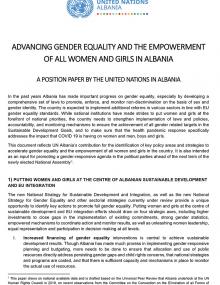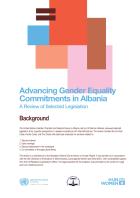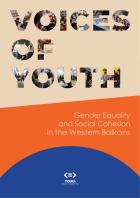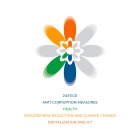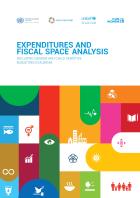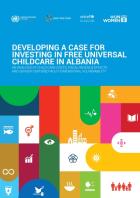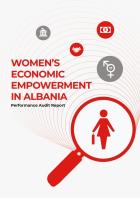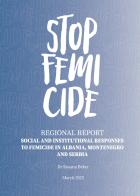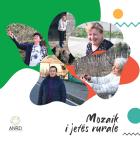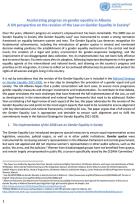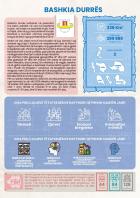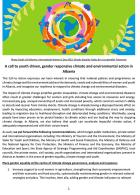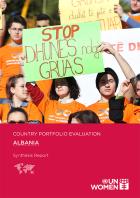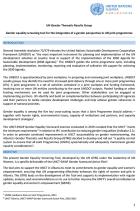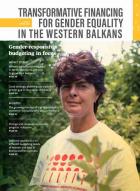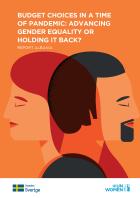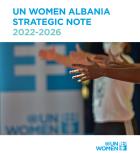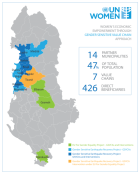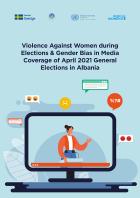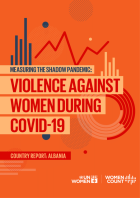1 - 20 of 70 Results
Pagination
Date:
The United Nations Gender Thematic and Results Group in Albania, led by UN Women Albania, reviewed selected legislation from a gender equality perspective, to assess compliance with international legal standards, including EU gender aquis.
Date:
This regional research, implemented by UN Women and co-designed, conducted and developed by five young researchers from Albania, Bosnia and Herzegovina, Kosovo1 , North Macedonia, and Serbia aims to explore the linkages between youth development, gender equality, and social cohesion challenges in the region.
Date:
This Guidance Notes series provides succinct information on the key gender issues in selected policy areas, and to show how gender mainstreaming can be done in practical terms. This set of tools is made available through the EU’s and UN Women’s technical support to the Government of Albania in the context of accelerating the process of EU integration.
Date:
This analysis aims to shed light on the scope of gender responsive fiscal policies to address gender and child sensitive socio-economic vulnerabilities. This report analyzes the selected gender-sensitive fiscal policy and the mechanisms through which the policies affect social protection systems including women labor force participation, wage gaps, GDP growth, public fiscal balances, income distribution, and poverty.
Date:
The study provides concrete evidence on how gender sensitive public investment has important ramifications in terms of who benefits from child care and job creation. Beyond “who” benefits, the report also presents a comparative analysis of “how much and what kind of” benefits can be expected from each additional dollar gender-sensitive public spending versus gender-blind spending in universal child care.
Date:
The Supreme State Audit Institution in Albania has conducted a performance audit on the “Economic Empowerment of Women”, in the framework of the “Transformative Financing for Gender Equality Towards More Transparent, Inclusive and Accountable Governance in the Western Balkans” project, financed by the Government of Sweden – SIDA, with the technical support of UN Women Albania.
Date:
The regional report “Social and institutional responses to femicide in Albania, Montenegro and Serbia” was developed by FemPlatz with the technical support of UN Women in the framework of the regional programme on ending violence against women in the Western Balkans and Türkiye “Implementing Norms, Changing Minds,” funded by the European Union. The report – the result of three years’ work to develop a framework for understanding the characteristics, patterns, and causes of femicide – is the first interdisciplinary research on the societal and institutional response to femicide in Albania, Montenegro and Serbia.
Date:
This photo album aims to showcase rural Albania, where women take on many roles. It contains different stories of women and girls from the areas of Puka, Elbasan and Kolonja, focusing on their challenges in their daily lives, family, work and leisure. This photo album was prepared by Albanian Network for Rural Development, a UN Women partner within the "Gender Rural Equality and Torusim” (GREAT) project, financed by the Italian Government.
Date:
A joint advocacy piece on the Gender Equality Law from the United Nations in Albania.
Date:
In the framework of UN Women project “Gender sensitive post-earthquake recovery and reconstruction”, the Regional Environmental Center, undertook a series of consultations and meetings with women, girls and youth in three earthquake damaged areas in Albania (Durres, Kamza and Lezha).
Date:
This manifesto includes a series of concrete recommendations to promote gender-responsive solutions to climate change that are youth-led, including innovative actions to push the climate and environmental justice agenda in the country.
Date:
This report presents the main findings, lessons learned, conclusions and recommendations of the Country Portfolio Evaluation of the UN Women Albania Country Office Strategic Note 2017– 2021, conducted between January and July 2021.
Date:
The “I Have a Dream” photography project, by UN Women Albania and Jutta Benzenberg, illustrates the dreams of Albanian young and adolescent women from remote areas of the country. This project is a call to society for equal rights and opportunities for defying gender stereotypes.
Date:
The Gender Equality Screening Tool for Joint Programmes was developed in 2022 by the Gender Thematic and Results Group (GTRG) in Albania. The tool aims to integrate a gender perspective across all components of a Joint Programme: the Programme analysis, the results framework, the M&E framework, the partnerships section and the management arrangement section.
Date:
The first issue of the magazine presents a selection of UN Women’s contributions and achievements in gender-responsive budgeting in the Western Balkans.
Date:
This report aims to identify how the financial rebalancing during COVID-19 affected the advancement of gender equality in the country as per the legal acts issued by the central government in response to the unprecedented health, social and economic crisis caused by the pandemic.
Date:
This publication describes UN Women Albania’s programme of work for the period 2022-2026. It highlights key areas of contribution of the Country Office across UN Women’s triple mandate of UN Coordination, normative support and operational activities.
Date:
In the framework of the Gender Sensitive post-earthquake Recovery and Reconstruction project, UN Women conducted 10 Gender Sensitive Value Chain Analysis (GSVCA) in the earthquake-affected municipalities of Shijak, Durrës, Krujë, Tiranë, Kavajë, Vorë, Rrogozhinë, Kurbin, Mirditë and Lezhë. These GSVCAs identify and promote ‘win-win’ scenarios that guarantee market sustainability, and provide development opportunities that address problems in a value chain in conjunction with addressing gender inequalities inherent in and along the chain.
Date:
A media monitoring study was conducted prior, during and after the general elections in Albania in 2021.
Date:
This publication compiles and analyses the results of Rapid Gender Assessment surveys on the impact of COVID-19 on violence against women (VAW RGAs) in Albania.
